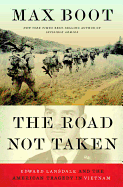
 The Road Not Taken: Edward Lansdale and the American Tragedy in Vietnam can, at times, feel like a departure for Max Boot, author of epic, sweeping histories such as Invisible Armies and The Savage Wars of Peace. The Road Not Taken not only focuses on a specific chunk of history but on a specific man: Edward Lansdale, an Air Force officer and legendary CIA operative said to be the inspiration for the protagonist in Graham Greene's The Quiet American. Boot dispels this belief along with many others, rescuing Lansdale's image from those who would cast him as a clueless, bumbling power broker. Instead, Boot argues that Lansdale's diplomatic and counterterrorism ideas were simply ahead of his time, forming the basis for an enormously influential "hearts and minds" strategy that offered both a more ethical and more effective vision for achieving U.S. aims abroad.
The Road Not Taken: Edward Lansdale and the American Tragedy in Vietnam can, at times, feel like a departure for Max Boot, author of epic, sweeping histories such as Invisible Armies and The Savage Wars of Peace. The Road Not Taken not only focuses on a specific chunk of history but on a specific man: Edward Lansdale, an Air Force officer and legendary CIA operative said to be the inspiration for the protagonist in Graham Greene's The Quiet American. Boot dispels this belief along with many others, rescuing Lansdale's image from those who would cast him as a clueless, bumbling power broker. Instead, Boot argues that Lansdale's diplomatic and counterterrorism ideas were simply ahead of his time, forming the basis for an enormously influential "hearts and minds" strategy that offered both a more ethical and more effective vision for achieving U.S. aims abroad.
As the subtitle suggests, Boot's book centers on Vietnam, where "Lansdalism" met with varying degrees of acceptance and success. Boot focuses on the decision by U.S. diplomats to authorize and push a military coup that overthrew President Ngo Dinh Diem in 1963. Boot argues that the decision fatally destabilized South Vietnam's already shaky government, with disastrous consequences for the war effort. It could have gone differently if only the right people had listened to a personable former-ad-man-turned-CIA-operative named Edward Lansdale.
For a real-life example of "the road not taken," Boot first takes us to the Philippines in the late '40s and early '50s, where Lansdale found a second homeland and his first tastes of success. Charged with helping to combat a Communist insurgency that threatened the Filipino postwar government, Lansdale started by befriending everyone in sight. A crucial part of Lansdale's effectiveness came through his diligent building of personal relationships and his ability to influence decision-making through persuasion and friendship rather than threats. He was also an immensely capable propagandist, promoting his favored candidate with catchy slogans and even a popular song. Lansdale was no peacenik, but his focus on community relations and minimizing civilian casualties were a far sight from the policies eventually adopted in Vietnam.
After successfully maneuvering his friend Ramon Magsaysay to power in the Philippines and helping defeat the Huk insurgency, Lansdale found initial acceptance exporting his ideas to Vietnam. After developing an important friendship with President Ngo Dinh Diem of the recently created South Vietnam, Lansdale helped to cement Diem's shaky grasp on power in the mid-'50s, navigating complicated political waters that had frustrated French colonialists before him. Unfortunately, Lansdale proved much less adept in the bureaucratic jungles of Washington, D.C., where he struck many powerful people as quaint or hopelessly idealistic. He returned to Vietnam with greatly diminished influence just as U.S. military involvement was escalating. His ideas were ignored and a war lost--Boot strongly suggests that the two are related. The Road Not Taken offers a portrait of Lansdale as well as a foreign policy alternative to the U.S.'s often heavy-handed, militarized approach. --Hank Stephenson, bookseller, Flyleaf Books, Chapel Hill, N.C.
Shelf Talker: Edward Lansdale was one of the most controversial figures in U.S. foreign policy, and The Road Not Taken rehabilitates his somewhat tarnished reputation.

